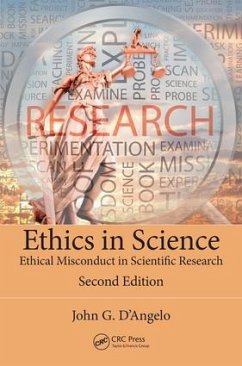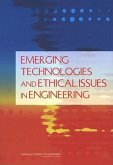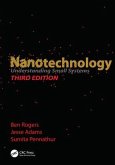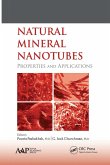- Broschiertes Buch
- Merkliste
- Auf die Merkliste
- Bewerten Bewerten
- Teilen
- Produkt teilen
- Produkterinnerung
- Produkterinnerung
Providing the tools necessary for a robust debate, this fully revised and updated second edition of Ethics in Science: Ethical Misconduct in Scientific Research explains various forms of scientific misconduct.
Andere Kunden interessierten sich auch für
![Emerging Technologies and Ethical Issues in Engineering Emerging Technologies and Ethical Issues in Engineering]() National Academy Of EngineeringEmerging Technologies and Ethical Issues in Engineering53,99 €
National Academy Of EngineeringEmerging Technologies and Ethical Issues in Engineering53,99 €![Transdermal and Intradermal Delivery of Therapeutic Agents Transdermal and Intradermal Delivery of Therapeutic Agents]() Ajay K BangaTransdermal and Intradermal Delivery of Therapeutic Agents83,99 €
Ajay K BangaTransdermal and Intradermal Delivery of Therapeutic Agents83,99 €![Superconductivity of Metals and Cuprates Superconductivity of Metals and Cuprates]() J R WaldramSuperconductivity of Metals and Cuprates165,99 €
J R WaldramSuperconductivity of Metals and Cuprates165,99 €![The Mathematics of Thermal Modeling The Mathematics of Thermal Modeling]() John Michael DowdenThe Mathematics of Thermal Modeling87,99 €
John Michael DowdenThe Mathematics of Thermal Modeling87,99 €![Nanotechnology Nanotechnology]() Ben RogersNanotechnology65,99 €
Ben RogersNanotechnology65,99 €![Green Biorenewable Biocomposites Green Biorenewable Biocomposites]() Green Biorenewable Biocomposites104,99 €
Green Biorenewable Biocomposites104,99 €![Natural Mineral Nanotubes Natural Mineral Nanotubes]() Natural Mineral Nanotubes103,99 €
Natural Mineral Nanotubes103,99 €-
-
-
Providing the tools necessary for a robust debate, this fully revised and updated second edition of Ethics in Science: Ethical Misconduct in Scientific Research explains various forms of scientific misconduct.
Hinweis: Dieser Artikel kann nur an eine deutsche Lieferadresse ausgeliefert werden.
Hinweis: Dieser Artikel kann nur an eine deutsche Lieferadresse ausgeliefert werden.
Produktdetails
- Produktdetails
- Verlag: CRC Press
- 2nd edition
- Seitenzahl: 144
- Erscheinungstermin: 14. Dezember 2018
- Englisch
- Abmessung: 235mm x 156mm x 9mm
- Gewicht: 236g
- ISBN-13: 9781138035423
- ISBN-10: 1138035424
- Artikelnr.: 54087916
- Herstellerkennzeichnung
- Libri GmbH
- Europaallee 1
- 36244 Bad Hersfeld
- gpsr@libri.de
- Verlag: CRC Press
- 2nd edition
- Seitenzahl: 144
- Erscheinungstermin: 14. Dezember 2018
- Englisch
- Abmessung: 235mm x 156mm x 9mm
- Gewicht: 236g
- ISBN-13: 9781138035423
- ISBN-10: 1138035424
- Artikelnr.: 54087916
- Herstellerkennzeichnung
- Libri GmbH
- Europaallee 1
- 36244 Bad Hersfeld
- gpsr@libri.de
Stony Brook University, Bachelor of Science (BS), Chemistry, 1996 - 2000 The University of Connecticut, Doctor of Philosophy (Ph.D.), Chemistry, 2000 - 2005 Postdoctoral Research Associate, Johns Hopkins University,2005 - 2007 Alfred University, NY, August 2007 - Present John D'Angelo teaches the following courses: Organic Chemistry I & II and associated labs; General Chemistry I & II labs and occasionally lectures; Basic (non majors) Organic Chemistry; How Science Changed the World (As a First Year Experience Course). He is also the current President of the Faculty Senate.
Scientific misconduct in research: What is it, why does it happen, and how
do we identify when it happens?
* What constitutes scientific misconduct?
* Authorship and intellectual property.
* Bad ethics vs. bad science.
* New results that prove old results wrong.
* The whistle-blower's dilemma.
What are the penalties for scientific misconduct?
* Human and animal subjects.
What is peer review's role in scientific misconduct?
* Revisiting Vlad and Frankie.
* Can peer reviewers be unethical?
* What effect on the public does scientific misconduct have?
* MMR and autism.
* Climategate.
* HIV vaccine.
* Animal rights groups.
* Cold fusion.
* Bernard Kettlewell.
* Electromagnetic field and high-tension power lines.
* Fracking and pollution.
What constitutes responsible conduct from the point+A76 of view of human
and animal subjects in research?
The ethics of the pharmaceutical industry.
Science and the public.
The role of government in scientific misconduct?
The responsibility of science to the environment.
Is there some research that shouldn't be done because of threats the
results may pose to society?
Summary of ethics guidelines of STEM professional societies.
Can Scientific misconduct be prevented?
* Intentional negligence in acknowledgment of previous work.
* Deliberate fabrication of data.
* Deliberate omission of known data that doesn't agree with hypotheses.
* Passing another researcher's data as one's own.
* Publication of results without consent of all the researchers.
* Failure to acknowledge all the researchers who performed the work.
* Conflict-of-interest issues.
* Repeated publication of too-similar results.
* Breach of confidentiality.
* Misrepresenting others' work.
* Wrapping up.
* Case Studies.
* Darwin and Wallace.
* Rangaswamy Srinivasan-VISX patent dispute.
* Schwartz and Mirkin.
* Corey and Woodward.
* Córdova, Scripps Research Institute, and Stockholm University.
* La Clair and hexacyclinol.
* Woodward and quinine.
* DNA.
* David Baltimore and Teresa Imanishi-Kari.
* John Fenn-Yale patent dispute.
* VIOXX®.
Index.
do we identify when it happens?
* What constitutes scientific misconduct?
* Authorship and intellectual property.
* Bad ethics vs. bad science.
* New results that prove old results wrong.
* The whistle-blower's dilemma.
What are the penalties for scientific misconduct?
* Human and animal subjects.
What is peer review's role in scientific misconduct?
* Revisiting Vlad and Frankie.
* Can peer reviewers be unethical?
* What effect on the public does scientific misconduct have?
* MMR and autism.
* Climategate.
* HIV vaccine.
* Animal rights groups.
* Cold fusion.
* Bernard Kettlewell.
* Electromagnetic field and high-tension power lines.
* Fracking and pollution.
What constitutes responsible conduct from the point+A76 of view of human
and animal subjects in research?
The ethics of the pharmaceutical industry.
Science and the public.
The role of government in scientific misconduct?
The responsibility of science to the environment.
Is there some research that shouldn't be done because of threats the
results may pose to society?
Summary of ethics guidelines of STEM professional societies.
Can Scientific misconduct be prevented?
* Intentional negligence in acknowledgment of previous work.
* Deliberate fabrication of data.
* Deliberate omission of known data that doesn't agree with hypotheses.
* Passing another researcher's data as one's own.
* Publication of results without consent of all the researchers.
* Failure to acknowledge all the researchers who performed the work.
* Conflict-of-interest issues.
* Repeated publication of too-similar results.
* Breach of confidentiality.
* Misrepresenting others' work.
* Wrapping up.
* Case Studies.
* Darwin and Wallace.
* Rangaswamy Srinivasan-VISX patent dispute.
* Schwartz and Mirkin.
* Corey and Woodward.
* Córdova, Scripps Research Institute, and Stockholm University.
* La Clair and hexacyclinol.
* Woodward and quinine.
* DNA.
* David Baltimore and Teresa Imanishi-Kari.
* John Fenn-Yale patent dispute.
* VIOXX®.
Index.
Scientific misconduct in research: What is it, why does it happen, and how
do we identify when it happens?
* What constitutes scientific misconduct?
* Authorship and intellectual property.
* Bad ethics vs. bad science.
* New results that prove old results wrong.
* The whistle-blower's dilemma.
What are the penalties for scientific misconduct?
* Human and animal subjects.
What is peer review's role in scientific misconduct?
* Revisiting Vlad and Frankie.
* Can peer reviewers be unethical?
* What effect on the public does scientific misconduct have?
* MMR and autism.
* Climategate.
* HIV vaccine.
* Animal rights groups.
* Cold fusion.
* Bernard Kettlewell.
* Electromagnetic field and high-tension power lines.
* Fracking and pollution.
What constitutes responsible conduct from the point+A76 of view of human
and animal subjects in research?
The ethics of the pharmaceutical industry.
Science and the public.
The role of government in scientific misconduct?
The responsibility of science to the environment.
Is there some research that shouldn't be done because of threats the
results may pose to society?
Summary of ethics guidelines of STEM professional societies.
Can Scientific misconduct be prevented?
* Intentional negligence in acknowledgment of previous work.
* Deliberate fabrication of data.
* Deliberate omission of known data that doesn't agree with hypotheses.
* Passing another researcher's data as one's own.
* Publication of results without consent of all the researchers.
* Failure to acknowledge all the researchers who performed the work.
* Conflict-of-interest issues.
* Repeated publication of too-similar results.
* Breach of confidentiality.
* Misrepresenting others' work.
* Wrapping up.
* Case Studies.
* Darwin and Wallace.
* Rangaswamy Srinivasan-VISX patent dispute.
* Schwartz and Mirkin.
* Corey and Woodward.
* Córdova, Scripps Research Institute, and Stockholm University.
* La Clair and hexacyclinol.
* Woodward and quinine.
* DNA.
* David Baltimore and Teresa Imanishi-Kari.
* John Fenn-Yale patent dispute.
* VIOXX®.
Index.
do we identify when it happens?
* What constitutes scientific misconduct?
* Authorship and intellectual property.
* Bad ethics vs. bad science.
* New results that prove old results wrong.
* The whistle-blower's dilemma.
What are the penalties for scientific misconduct?
* Human and animal subjects.
What is peer review's role in scientific misconduct?
* Revisiting Vlad and Frankie.
* Can peer reviewers be unethical?
* What effect on the public does scientific misconduct have?
* MMR and autism.
* Climategate.
* HIV vaccine.
* Animal rights groups.
* Cold fusion.
* Bernard Kettlewell.
* Electromagnetic field and high-tension power lines.
* Fracking and pollution.
What constitutes responsible conduct from the point+A76 of view of human
and animal subjects in research?
The ethics of the pharmaceutical industry.
Science and the public.
The role of government in scientific misconduct?
The responsibility of science to the environment.
Is there some research that shouldn't be done because of threats the
results may pose to society?
Summary of ethics guidelines of STEM professional societies.
Can Scientific misconduct be prevented?
* Intentional negligence in acknowledgment of previous work.
* Deliberate fabrication of data.
* Deliberate omission of known data that doesn't agree with hypotheses.
* Passing another researcher's data as one's own.
* Publication of results without consent of all the researchers.
* Failure to acknowledge all the researchers who performed the work.
* Conflict-of-interest issues.
* Repeated publication of too-similar results.
* Breach of confidentiality.
* Misrepresenting others' work.
* Wrapping up.
* Case Studies.
* Darwin and Wallace.
* Rangaswamy Srinivasan-VISX patent dispute.
* Schwartz and Mirkin.
* Corey and Woodward.
* Córdova, Scripps Research Institute, and Stockholm University.
* La Clair and hexacyclinol.
* Woodward and quinine.
* DNA.
* David Baltimore and Teresa Imanishi-Kari.
* John Fenn-Yale patent dispute.
* VIOXX®.
Index.








